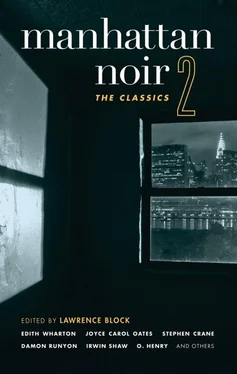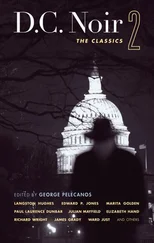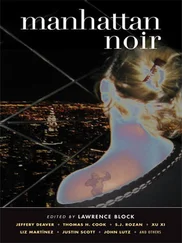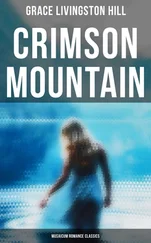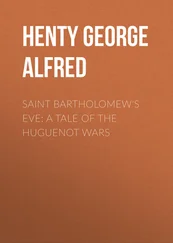Now a crisis arises. Not in my life, because that’s nearly over; but in my illusions.
Will he go to his friend and try to stand by him, or will he let his friend go by?
He can’t make it, sure I know that, he can never get in here past them; but he can make the try, there’s just enough slack for him to do that. There’s still half the width of the street ahead of him clear and untrammeled, for him to try to bolt across, before they spring after him and rough him up and fling him back. It’s the token of the thing that would count, not the completion.
But it doesn’t happen that way, I keep telling myself knowingly and sadly. Only in our fraternity pledges and masonic inductions, our cowboy movies and magazine stories, not in our real-life lives. For, the seventeenth-century humanist to the contrary, each man is an island complete unto himself, and as he sinks, the moving feet go on around him, from nowhere to nowhere and with no time to lose. The world is long past the Boy Scout stage of its development; now each man dies as he was meant to die, and as he was born, and as he lived: alone, all alone. Without any God, without any hope, without any record to show for his life.
My throat feels stiff, and I want to swallow but I can’t. Watching and waiting to see what my friend will do.
He doesn’t move, doesn’t make up his mind, for half a minute, and that half a minute seems like an hour. He’s doped by what he’s been told, I guess. And I keep asking myself while the seconds are ticking off: What would I do? If there were me down there, and he were up here: What would I do? And I keep trying not to look the answer in the face, though it’s staring at me the whole time.
You haven’t any right to expect your friends to be larger than yourself, larger than life. Just take them as they are, cut down to average size, and be glad you have them. To drink with, laugh with, borrow money from, lend money to, stay away from their special girls as you want them to stay away from yours, and above all, never break your word to, once it’s been given.
And that is all the obligation you have, all you have the right to expect.
The half-minute is up, and Johnny turns, slowly and reluctantly, but he turns, and he goes back to the opposite side of the street. The side opposite to me.
And I knew all along that’s what he would do, because I knew all along that’s what I would have done too.
I think I hear a voice say slurredly somewhere in the shadows, “That’s the smart thing to do,” but I’m not sure. Maybe I don’t, maybe it’s me I hear.
He gets back in the car, shoulders sagging, and keys it on. And as he glides from sight the music seems to start up almost by itself; it’s such second nature for him to have it on by now. It fades around the corner building, and then a wisp of it comes back just once more, carried by some cross-current of the wind: Fools rush in, Where wise men never dare to go — and then it dies away for good.
I bang my crushed-up fist against the center of my forehead, bring it away, then bang it again. Slow but hard. It hurts to lose a long-term friend, almost like losing an arm. But I never lost an arm, so I really wouldn’t know.
Now I can swallow, but it doesn’t feel good anymore.
I hear a marginal noise outside in the hall, and I swing around in instant alert. It’s easy enough to decipher it. A woman is being taken from her room nearby — in case the going gets too rough around here in my immediate vicinity, I suppose.
I hear them tap, and then she comes out and accompanies them to safety. I hear the slap-slap of her bedroom slippers, like the soft little hands of children applauding in a kindergarten, as she goes hurrying by with someone. Several someones. You can’t hear them, only her, but I know they’re with her. I even hear the soft sch sch of her silk wrapper or kimono as it rustles past. A noticeable whiff of sachet drifts in through the door seam. She must have taken a bath and powdered herself liberally just moments ago.
Probably a nice sort of woman, unused to violence or emergencies of this sort, unsure of what to bring along or how to comport herself.
“I left my handbag in there,” I hear her remark plaintively as she goes by. “Do you think it’ll be all right to leave it there?”
Somebody’s wife, come to meet him in the city and waiting for him to join her. Long ago I used to like that kind of woman. Objectively, of course, not close-up.
After she’s gone, another brief lull sets in. This one is probably the last. But what good is a lull? It’s only a breathing spell in which to get more frightened. Because anticipatory fear is always twice as strong as present fear. Anticipatory fear has both fears in it at once — the anticipatory one and the one that comes simultaneously with the dread happening itself. Present fear only has the one, because by that time anticipation is over.
I switch on the light for a moment, to see my way to a drink. The one I had is gone — just what used to be ice is sloshing colorlessly in the bottom of the glass. Then when I put the recharged glass down again, empty, it seems to pull me after it, as if it weighed so much I couldn’t let go of it from an upright position. Don’t ask me why this is, I don’t know. Probably simple loss of equilibrium for a second, due to the massive infusion of alcohol.
Then with no more warning, no more waiting, with no more of anything, it begins. It gets under way at last.
There is a mild-mannered knuckle rapping at the door. They use my name. A voice, mild-mannered also, says in a conciliatory way, “Come out, please. We want to talk to you.” “Punctilious,” I guess, would be a better word for it. The etiquette of the forcible entry, of the break-in. They’re so considerate, so deferential, so attentive to all the niceties. Hold your head steady, please, we don’t want to nick your chin while we’re cutting your throat.
I don’t answer.
I don’t think they expected me to. If I had answered, it would have astonished them, thrown them off their timing for a moment.
The mild-voiced man leaves the door and somebody else takes his place. I can sense the shifting over more by intuition than by actual hearing.
A wooden toolbox or carryall of some sort settles down noisily on the floor outside the door. I can tell it’s wooden, not by its floor impact but by the “settling” sound that accompanies it, as if a considerable number of loose and rolling objects in it are chinking against its insides. Nails and bolts and awls and screwdrivers and the like. That tells me that it’s a kit commonly used by carpenters and locksmiths and their kind.
They’re going to take the lock off bodily from the outside.
A cold surge goes through me that I can’t describe. It isn’t blood. It’s too numbing and heavy and cold for that. And it breaks through the skin surface, which blood doesn’t ordinarily do without a wound, and emerges into innumerable sting pin pricks all over me. An ice-sweat.
I can see him (not literally, but just as surely as if I could), down on one knee, and scared, probably as scared as I am myself, pressing as far back to the side out of the direct line of the door as he can, while the others, bunched together farther back, stand ready to cover him, to pile on me and bring me down if I should suddenly break out and rush him.
And the radio tells me sarcastically to “Light up, you’ve got a good thing going.”
I start backing away, with a sleepwalker’s fixity, staring at the door as I retreat, or staring at where I last saw it, for I can’t see it in the dark. What good would it do to stay close to it, for I can’t hold it back, I can’t stop it from opening. And as I go back step after step, my tongue keeps tracking the outside outline of my lips, as if I wondered what they were and what they were there for.
Читать дальше
